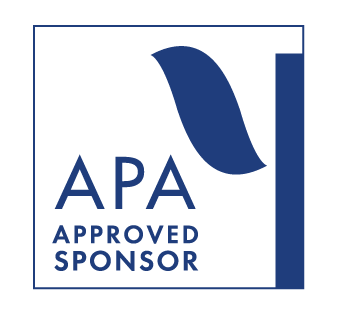ACTing in the present: How to use the ACT Matrix to conceptualize cases and benefit clients
- Topic Areas:
- Acceptance & Commitment Therapy | Mindfulness
- Categories:
- Pre-Recorded Homestudy
- Speakers:
- Jes Leonard PsyD | Thomas Scaggs
- Course Levels:
- Introductory
- Duration:
- 3 Hours 58 Minutes
- Format:
- Audio and Video
- License:
- Never Expires.
Producer: New Hampshire Psychological Association
Description
Acceptance and Commitment Therapy (ACT) is an evidence-based transdiagnostic modality that has been researched and utilized with various clinical presentations and populations. Those who are trained in ACT are most likely familiar with the “Hexaflex”, however they may not be familiar with the ACT Matrix (Polk, Hambright, Webster). The ACT Matrix provides a visual and action-oriented conceptualization for both clinicians and clients to identify areas of difficulty and specific interventions that can promote psychological flexibility.
This training will review the six elements of ACT (with emphasis on mindfulness, defusion, and values) and introduce how to conceptualize a clinical presentation using the ACT Matrix.
Credits
Vermont
4 CE Credits
The Vermont Psychological Association is approved by the American Psychological Association to sponsor continuing education for psychologists, and is also approved by the Vermont Board of Psychological Examiners to sponsor continuing education for psychologists licensed in Vermont. This course is intended to qualify for specialty mandated credit types as follows:
Ethics: 0
Cultural Competency: 0
Continuing education courses sponsored by the Vermont Psychological Association are pre-approved by the Vermont Office of Professional Regulation for continuing education credit for licensed independent clinical social workers in Vermont. This course is intended to qualify for the following specialty mandated credit types;
Ethics: 0
Cultural Competency: 0
Continuing education courses sponsored by the Vermont Psychological Association are pre-approved by the Vermont Board of Allied Mental Health for continuing education credit for licensed clinical mental health counselors and licensed marriage and family therapists in Vermont. This course is intended to qualify for the following specialty mandated credit types:
Ethics: 0
Cultural Competency: 0
Connecticut
4 CE Credits
The Vermont Psychological Association is approved by the American Psychological Association to sponsor continuing education for psychologists. The Connecticut accepts these credits for continuing education for psychologists in Connecticut pursuant to Conn. Gen. Stat. § 20-191c(b). This course is intended to qualify for specialty mandated credit types as follows:
Veterans' Mental Health: 0
The Vermont Psychological Association is approved by the American Psychological Association to sponsor continuing educaiton for psychologists. Based on this approval, this course is pre-approved for credit for Connecticut licensed professional counselors under Conn. Agencies Regs § 20-195cc-3(a)(1). This course is intended to qualify for mandated credit types as follows:
Ethics: 0
Veterans' Mental Health: 0
New Hampshire
4 CE Credits
The Vermont Psychological Association is approved by the American Psychological Association to sponsor live continuing education for psychologists. The New Hampshire Board of Psychologists accepts credits earned from courses sponsored by APA-approved sponsors as indicated in Psyc § 402.01(d)(11). This course is intended to qualify for specialty mandated credit types as follows:
Ethics: 0
The Vermont Psychological Association is approved by the American Psychological Association to offer continuing education to psychologists. As a course sponosred by an organization with such approval, these credits are also accepted by the New Hampshire Board of Mental Health Practice for clinical social workers licensed in New Hampshire, as provided in Mhp 402.02(b)(1). This course is intended to qualify for the following specialty mandated credits:
Ethics: 0
Suicide Prevention: 0
The Vermont Psychological Association is approved by the American Psychological Association to offer continuing education to psychologists. As a course sponosred by an organization with such approval, these credits are also accepted by the New Hampshire Board of Mental Health Practice for clinical mental health counselors licensed in New Hampshire, as provided in Mhp 402.02(b)(1). This course is intended to qualify for the following specialty mandated credits:
Ethics: 0
Suicide Prevention: 0
The Vermont Psychological Association is approved by the American Psychological Association to offer continuing education for psychologists. As a course sponosred by an organization with such approval, these credits are also accepted by the New Hampshire Board of Mental Health Practice for marriage and family therapists; pastoral psychotherapists; and school social workers licensed in New Hampshire, as provided in Mhp 402.02(b)(1). The course is intended to qualify for the following specialty mandated credit types:
Ethics: 0
Suicide Prevention: 0
Other States Accepting Credits from APA-Approved Sponsors
4 CE Credits
The Vermont Psychological Association is approved by the American Psychological Association to sponsor live continuing education for psychologists. The Vermont Psychological Association maintains responsibility for its programs and their content. Psychologists and other professionals licensed in states whose respective licensing boards approve continuing education offered by APA-approved sponsors may earn continuing education credits for this course.

The New Hampshire Psychological Association is approved by the American Psychological Association to sponsor continuing education for psychologists. The New Hampshire Psychological Association maintains responsibility for this course and its content.
Completion of this course earns 4 continuing education credits. Psychologists licensed in states which approve courses sponsored by APA-approved sponsors may earn homestudy continuing education credit for taking this course.
Handouts
| DOTS_May_2017_Russ_Harris (20.5 KB) | Available after Purchase | ||
| Valued-Living-Questionnaire (11.3 KB) | Available after Purchase | ||
| ACT ACE (2) (546.4 KB) | Available after Purchase | ||
| Harris simple ways to get present (2) (630.7 KB) | Available after Purchase | ||
| NHPA - Mindfulness Defusion Values Acceptance (4.7 MB) | Available after Purchase | ||
Speaker
Jes Leonard PsyD Related Seminars and Products
Dr. Jes Leonard earned her doctoral degree in Counseling Psychology from West Virginia University and her M.S. in sport psychology from Ithaca College. She completed her postdoctoral residency at the VA Maine Healthcare System in Augusta, Maine and pre-doctoral internship at the VA Pittsburgh Healthcare System in Pittsburgh Pennsylvania. At both training sites, Dr. Leonard exclusively utilized ACT on her various rotations. Additionally, her post-doc fellowship was partly supervised by Dr. Jerold Hambright, one of the co-creators of the ACT Matrix.
Dr. Leonard currently works at Lifestance Health, NH as a licensed psychologist and supervisor who specializes in trauma-focused therapy (using ACT as well as IFS, CPT, and PE). She provides regular ACT Matrix trainings for fellow clinicians. She is the current Training Director of the post-doc and practicum program and Regional Clinical Assessment Director of Lifestance NH/ME. In addition to her clinical practice, Dr. Leonard is an Assistant Professor of Practice in the Rivier University PsyD program.
Thomas Scaggs Related Seminars and Products
Thomas is a third-year doctoral student in the Combined Counseling and School Psychology (Psy.D.) program at Rivier University in Nashua, NH. Prior to serving in the U.S. Army, Thomas was involved in social work providing services to adults and children with developmental and intellectual disabilities both in home and in the community. Attaining a Master’s in Developmental Psychology while enlisted as a public affairs noncommissioned officer, he has always been driven by a strong desire to make a positive impact on the world and entered his doctoral program immediately after being honorably discharged. Thomas has completed a master’s-level internship in Kansas, a doctoral practicum within the Chelmsford Public School system, and is presently working with Dr. Leonard at LifeStance providing adolescent and adult therapy using the ACT model. In his free time, he enjoys traveling, attending concerts, meditation, and doing just about anything family oriented.
Course Objectives
Objective 1Summarize how to use the ACT Matrix as a clinical conceptualization tool
Objective 2
Describe how to practice and teach present-moment awareness/mindfulness by differentiating between direct and indirect experience
Objective 3
Identify at least two exercises to practice present-moment awareness/mindfulness in a nonjudgmental way
Objective 4
Observe how to teach and practice defusion techniques with clients
Objective 5
Describe the difference between “towards” and “away” valued moves and how to present these concepts to clients



